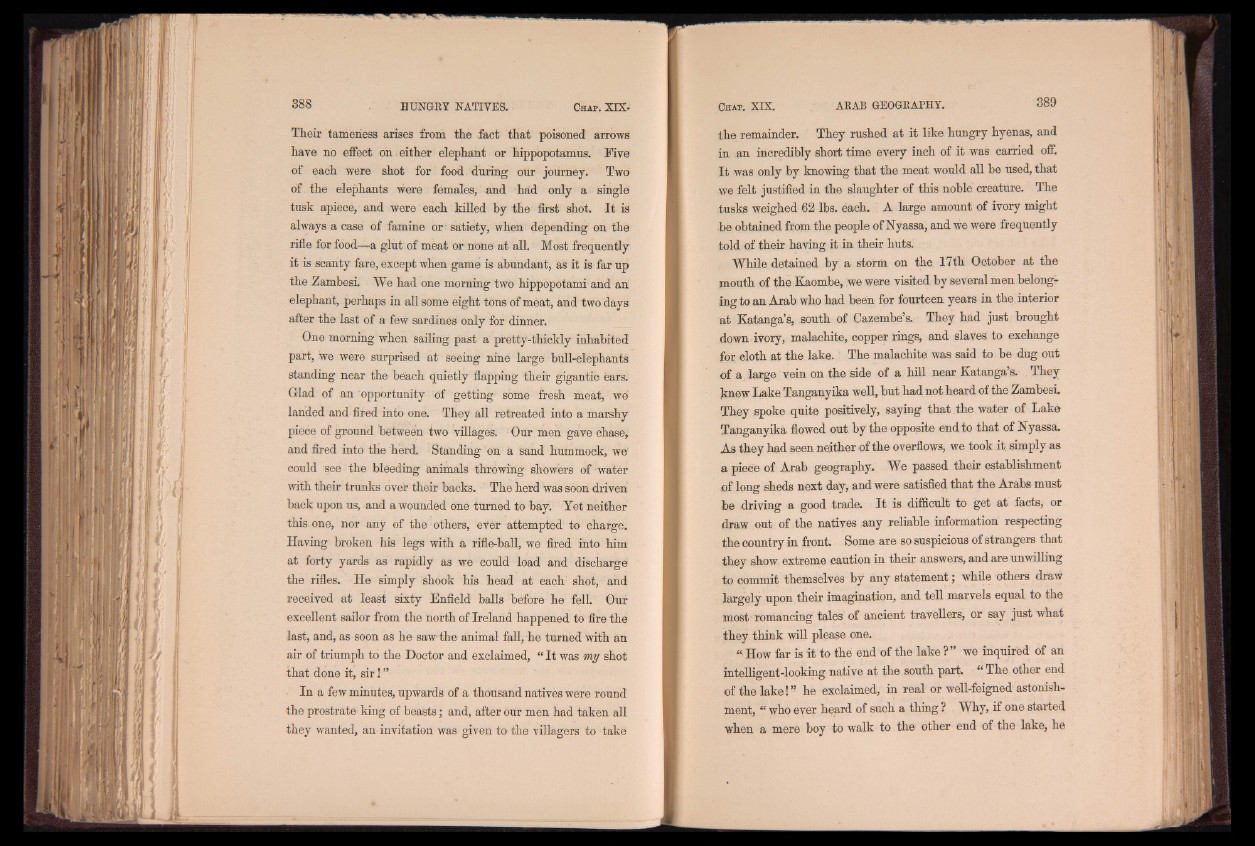
Their tameness arises from thè fact that poisoned arrows
have no effect on ■ either elephant or hippopotamus. Five
of each were shot for food during our journey. Two
of the elephants were females, and had only a single
tusk apifecfe, and were each killed by the first shot. I t is
always a case of famine or satiety, when depending on the
rifle for food^-a glut of meat or none at all. Most frequently
it is scanty fare, except when game is abundant, as it is far up
the Zambesi. We had one morning two hippopotami and an
elephant, perhaps in all some eight tons of mèat, and two days
after the last of a few sardines only for dinner.
One morning when sailing past a pretty-thickly inhabited
part, we were surprised at seeing nine large bull-elephants
standing near the beach quietly flapping their gigantic fears.
Glad of an opportunity of getting' sòme fresh meat, we
landed and fired into one. They all retreated into a marshy
piece of ground between two villages. Our men gave chase,
and fired into the herd. Standing on à sand hummock, we’
could see the blfeeding animals throwing showers of water
with their trunks over their backs. The herd was soon driven
back upon us, and a wounded one turned to bay. Tet neither
this one, nor any of the others, ever attempted to charge.
Having broken his legs with a fifle-ball, we fired into him
at forty yards as rapidly as we could load and discharge
the rifles. He simply shook his head at each shot, and
received at least sixty Enfield balls before he fell. Our
excellent sailor from the north of Ireland happened to fire the
last, and, as-soon as he saw the animal fall, he turned with an
air of triumph to the Doctor and exclaimed, “ I t was my shot
that done it, sir ! ”
In a few minutes, upwards of a thousand natives were round
the prostrate king of beasts ; and, after feur men had taken all
they wanted, an invitation was given to the villagers to take
the remainder. They rushed at it like hungry hyenas, and
in an incredibly short time every inch of it was carried off.
I t was only by knowing that the meat would all be used, that
we felt justified in the slaughter of this noble creature. The
tusks weighed 62 lbs. each. A large amount of ivory might
.be obtained from the people of Nyassa, and we were frequently
told of their having it in their huts.
While detained by a storm on the 17th October at the
mouth of the Kaom.be, ;we were visited by several men belonging
to an Arab, who had been for fourteen years in the: interior
at Katanga’s, south of Cazembe’s. They had just brought
down ivory, malachite, copper rings, and slaves to exchange
for cloth at the lake. The malachite was said to be dug out
of a. large vein on the side of a hill near Katanga’s. . They
knew Lake Tanganyika well, but had not heard of the Zambesi.
They spoke quite positively, saying that the water of Lake
Tanganyika flowed out by the opposite end to that of Nyassa.
As they had seen neither of the overflows, we took it. simply as
a piece of Arab geography. We passed their establishment
of long sheds next day, and were satisfied that the Arabs must
be driving a good trade. I t is difficult to get at facts, or
draw out of,the natives any reliable information respecting
the country in front. Some are so suspicious of strangers that
they show extreme caution in their answers, and are unwilling
to commit themselves by any statement; while others draw
largely upon their imagination, and tell marvels equal to the
most romancing tales of ancient travellers, or say just what
they think will please one.
“ How far is it to the end of the lake ?” we inquired of an
intelligent-looking native at the.south part. “ The other end
of the lake!” he exclaimed, in real or well-feigned astonishment,
“ who ever heard of such a thing ? Why, if one started
when a mere boy to walk to the other end of the lake, he